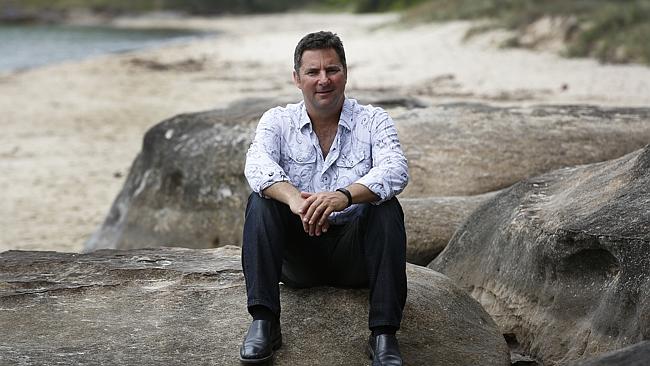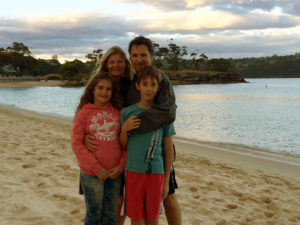Former tech entrepreneur Larry Marshall did his first-ever cadetship with us. Image: David Moir / News Corp Australia
He has founded six successful companies, holds 20 patents and began his career as an engineer with a PhD in physics. And, a month ago, he took the reins as Chief Executive of CSIRO. We sat down with Dr Larry Marshall to hear how he’s settling in.
You’ve been in the job for a month now. What are your first impressions of CSIRO?
Well, I know it’s only been a month, but I already feel like there’s so much research happening here that I’ll need another lifetime to discover it all.
It’s clear to me that people who work here want to make a difference. They really care about science and the opportunities it can offer to the community, the environment and to the economy. They’re supportive of each other and really want us to be the best we can be.
Is there any research you’ve heard about at CSIRO that particularly stands out to you?
I could inundate you with examples. Just off the top of my head, we recently helped someone walk again by 3D printing a titanium heel bone that his surgeon was able to implant.
We’ve developed a technology that helps remotely control longwall mining equipment so miners are safer and productivity is boosted by 10%.
We’ve used our maths and informatics skills to develop a tool to predict the number of people who will go to hospital emergency departments and by helping the hospitals better plan, we’ve saved them tens of millions of dollars and reduced the time people wait for a bed.
Right through to other examples like the work we’ve done to breed the perfect prawn that by 2020 will add more than $120 million to the value of the industry.
I could keep going, but I should probably stop there.
There’s been some conjecture around your views on water divining recently. Is there anything you’d like to say on that subject?
My grandfather was friends with a tribal elder who would walk our land trying to feel where the river had gone – he explained to me as a kid that the river was still there just hidden beneath the ground. He was very successful in figuring out where Granddad should drill. Drilling is very expensive so you need all the help you can get.
Now clearly, that wasn’t a scientific experiment and I was wrong to quote figures for success – I said it right the first time – “have you seen farmers find water?” – but later realised I shouldn’t have used the word “dowsing” which to me means find water, but apparently there are more narrow interpretations.
I was surprised by the reaction but also by the number of letters of support I received from people who clearly got what I was trying to say, which was: Entrepreneurship is about seeing a problem and imagining a solution, then inventing the technology to solve it. The inventor of the flip phone at Motorola was doubtless inspired by Star Trek.
A couple of years back, CSIRO’s Materials Science and Engineering team came up with a way to miniaturise atomic clocks and do what the Grace satellites do to detect water via gravitational anomalies. Entrepreneurship, like science, isn’t about playing it safe – if we aren’t failing we aren’t trying hard enough.
For me there is no such thing as failure, there is only learning – we can always do better (especially me with the media).
Enjoying the best of Sydney’s beaches. Larry with his wife Maria and their two kids.
CSIRO has been through a lot of changes in the past year. Is that all over now?
That’s true. We are emerging from some rapid structural changes and I can’t promise that change is now over – that would be unrealistic in a world moving as fast as ours.
What I want to do is help our organisation focus on how we can contribute to the innovation, discovery and growth that Australia has come to expect from its premier research organisation.
So how do you do that?
We’ve got to focus our efforts and continually measure and demonstrate our impact. We’ve got to be more entrepreneurial and agile. We’ve got to get our overheads down and create value for our customers, and we’ve got to create some more headroom for exploration.
The first step is to get the framework right and that comes down to our strategy. That’s my big priority and something we’ll be locking down before June.
I have learned a lot about lean innovation and focussing on where we are unique. You’ll hear more about this, but let’s just say we’re learning from the lean innovation movement. Each and every person in our organisation will have a voice in this…
The genius and the power of CSIRO is distributed – it’s in our people, our partners and our community. We know a diversity of views is critical to innovation performance.
What’s next?
The more I learn about this place, the more conversations I have, the more amazing things I discover about CSIRO. I will be endeavouring this year to meet as many staff as possible, to hear about their work, and to learn from our customers and stakeholders about what we need to do to make CSIRO even stronger and more successful.
And do you think we’ll be starting our dragon research anytime soon?
I guess we’ll have to wait to see what comes out in the strategy. We should check in with Sophie about it.




10th March 2015 at 6:26 pm
Hello Dr. Marshall, Recently on Stradbroke Island our family was devastated to see the plastic garbage on the beach. We went down as a 3 generational pact of 7,and picked up plastic for an hour or so. After I thought, why not have bags at the beginning of the beach and suggest each person pick up 10 pieces of plastic. As a scientist, you know the effect on our marine life, but I am not sure others do. A simple chart showing people the effect on birds etc could inspire.
Regards
Chrystine Denney
6th March 2015 at 4:53 am
I think CSIRO does a grand job ! As a chemist, well not any longer but I have two degrees in the subject, I have long known about it since a major analytical tool, atomic absorption spectroscopy, was invented by one of its researchers. Dr Marshall makes an impressive case for continuing support by the Australian Government and industrial partners. I wish, as a U.K. citizen we had a comparable institution, but alas the Thatcher years took their toll and some employees lacked an entrepreneurial spirit.
25th February 2015 at 5:42 pm
Ho tradotto in italiano il tuo articolo e ho capito cos’è il CSIRO un ente di ricerca, siete ammirevoli continuate così! Belle le foto, ciao!